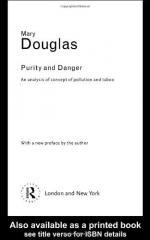
|
Chapter 1
1. To study purity and pollution, what does Douglas believe one must understand?
(a) Jewish concepts.
(b) Reproductive health.
(c) Religious concepts.
(d) Hygiene concepts.
2. Which of the following are a part of primitive views, according to Douglas?
(a) Ethics.
(b) Solely mechanical symbols.
(c) Symbols nobody can decipher now.
(d) Solely pollution.
3. Which of the following relationships is unclear to Douglas?
(a) Pollution and science.
(b) Religion and magic.
(c) Ritual and purity.
(d) Science and magic.
4. What do Greek studies of purity and impurity involve?
(a) Jewish concepts.
(b) Classical dramatists.
(c) Theology.
(d) Lack of pollution or purity.
5. What does the union between God and people involve in Douglas' view?
(a) Purity.
(b) Perseverance.
(c) Pollution.
(d) Struggle.
6. According to Douglas, who had contempt for primitive society through preconceived judgments?
(a) Durkheim.
(b) Frazer.
(c) Smith.
(d) Robertson.
7. Who criticized Frazer for being complacent?
(a) Smith.
(b) Robertson.
(c) Durkheim.
(d) Douglas.
8. What did Durkheim view ritual as symbolic of?
(a) Ethics.
(b) Religion.
(c) Social processes.
(d) Pollution.
9. Who separated magic from morals and religion?
(a) Smith and Frazer.
(b) Douglas and Frazer.
(c) Robertson and Durkheim.
(d) Durkheim.
(read all 180 Multiple Choice Questions and Answers)
|
This section contains 3,290 words (approx. 11 pages at 300 words per page) |

|




